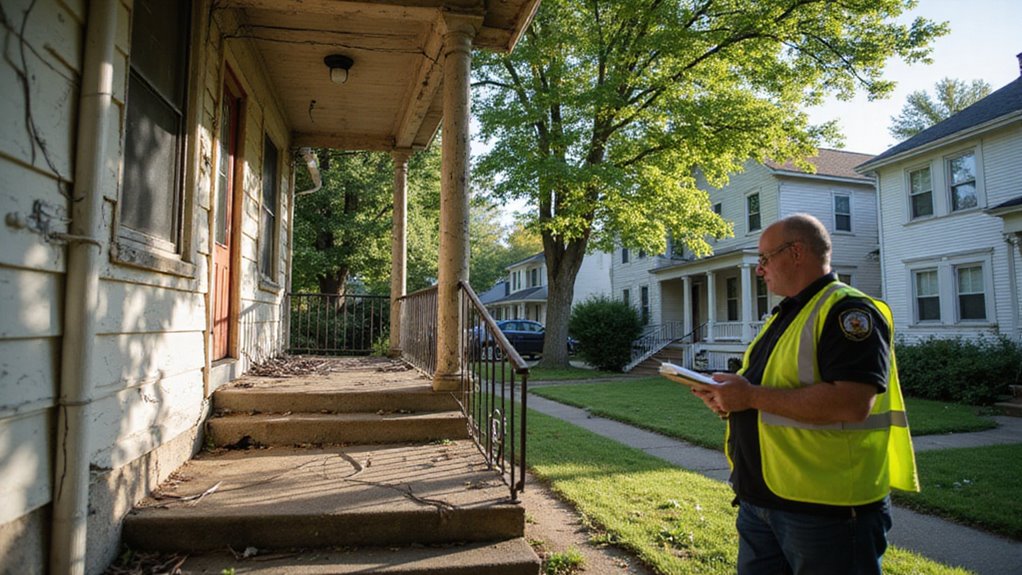Selling a House With Code Violations in Cincinnati




Selling a house with code violations in Cincinnati can feel overwhelming. Many homeowners worry about legal risks and lower sale prices. Code violations like faulty wiring or plumbing make selling traditionally much harder. Buyers may walk away or demand big repairs.
Delays and extra costs can pile up fast. Stress and uncertainty often stop people from moving forward. You can still sell a house with code violations in Cincinnati if you understand your options and follow the right steps.
You must know how to disclose issues and find buyers who accept properties in “as-is” condition. This blog will guide you through the process and help you make the best decision for your situation.
Table of Contents
Understanding Building Code Compliance

Building code compliance means your Cincinnati house meets all local rules for homes. If your property follows these rules, selling is easier. If it does not, you may face delays or lower offers.
The city requires all homes to meet safety and structure standards. If your home is in a historic area, special rules may apply. You must check these before listing your house for sale.
If your property is near factories or built with old materials, environmental checks may be needed. Issues like lead paint or asbestos must be reported to buyers. Addressing these early can help you sell faster and at a better price.
Common Code Violations in Cincinnati
When selling in Cincinnati, you’ll often encounter code violations related to structural integrity, outdated electrical systems, or plumbing deficiencies. Local inspectors also flag properties for safety hazards like missing handrails or faulty smoke detectors, which can delay transactions. Recognizing these common issues helps you foresee market expectations and streamline your sales process.
Structural issues are among the most serious code violations in Cincinnati homes. These problems include foundation damage, roof leaks, and uneven floors. If left unaddressed, they can lower your property’s value. Cracks in walls or floors may signal foundation trouble. Roof problems like missing shingles or sagging can also raise concern. Local inspectors and buyers often look for these warning signs.
Cincinnati’s older homes and harsh weather can make structural issues worse. If you plan to sell, you should address these problems early. Ignoring code violations can delay sales or reduce your profit. Buyers and investors often lower their offers if repairs are needed. If you fix structural issues before listing, you may get better offers. Addressing these risks helps you negotiate with confidence.
Electrical Problems
Plumbing Violations
Safety Hazards
Electrical code violations can make it hard to sell a home in Cincinnati. If your wiring is not up to code, buyers may worry. Lenders might also refuse to finance homes with electrical issues.
Common problems include old knob-and-tube or aluminum wiring. Missing or broken GFCI outlets in kitchens, bathrooms, or basements are also a concern. Overloaded circuits or bad panel installations can cause safety risks.
If you fix these problems before selling, your home may attract more buyers. Being honest about any issues can also help avoid delays. Addressing electrical issues early protects your home’s value and safety.
Plumbing violations can make it harder to sell your home in Cincinnati. These problems lower your home’s value and scare away buyers. Fixing violations before selling helps your home stand out.
Older homes may have pipes that do not meet current codes. Problems like leaks, poor venting, or unsafe water heaters are common violations. If inspectors find these, it can delay or stop a sale.
Cincinnati’s plumbing codes protect health and safety. Issues such as cross-connections or missing backflow devices must be corrected. Poor drainage or sewage leaks can damage your yard and affect curb appeal.
If you resolve plumbing violations early, you can avoid buyer concerns. This makes the selling process smoother and faster. It also helps you get a better price for your home.
Safety hazards in a home can cause serious problems when selling in Cincinnati. These issues often lead to code violations and can delay or stop the sale. Local inspectors look for hazards that could harm residents or buyers.
If a home has major safety problems, you may not get an occupancy permit. Common issues include fire risks or weak building structures. These must be fixed before selling the property.
Exposed or old wiring is unsafe and breaks local codes. Missing or broken smoke detectors do not meet Cincinnati’s fire safety rules. Broken handrails or stairs make falls more likely in the home.
Blocked exits or poor escape routes are not allowed by local laws. If these are found, you might fail the occupancy inspection. Addressing these hazards early can prevent surprises at closing.
How to Handle Code Violation Sale
When selling a property with code violations, you’ll need to start with a thorough violation assessment and obtain accurate cost estimates for remediation. It’s crucial to understand your disclosure requirements under Ohio law and weigh the financial impact of repair options versus selling as-is. By approaching these factors strategically, you can protect your interests and optimize your market outcome.
A violation assessment is the first step before selling a property with code violations in Cincinnati. This process helps you find all problems flagged by inspectors. It also lets you understand your duties and what buyers might worry about. Start by checking if the property meets Cincinnati’s zoning and historical codes. If the city or county already listed violations, request a full copy. You should also walk through the property to spot any missed issues.
Take clear photos and notes for each violation. Buyers value honesty, so this information builds trust. If you need help, real estate experts with code violation experience can guide you. A good violation assessment can make selling easier. It helps you avoid surprises and prepares you for negotiations. If you do this well, you increase your chances of a smooth sale.
Cost Estimates
Disclosure Requirements
Repair Options
Cost estimates help you understand the financial impact of selling a house with code violations in Cincinnati. Sellers must know repair costs and how they affect home value. Accurate numbers guide your decisions during the process.
A home inspection uncovers hidden issues needing repairs. If you know these problems, you can estimate expenses more clearly. Cost estimates help decide if fixing or selling “as-is” is better.
If you include these costs in your price, you can attract more buyers. Sellers can also use these figures to negotiate. Knowing your expenses keeps you competitive in Cincinnati’s market.
When selling a house with code violations in Cincinnati, Ohio law requires you to disclose all known defects. You must tell buyers about code violations, unpermitted work, or any issues with historical building codes. If you fail to disclose, you risk legal trouble and losing the sale.
The Residential Property Disclosure Form should list all violations. State clearly if any work was done without permits or proper approval. Include details about any problems with old building codes.
You should also provide any letters or notices from city inspectors or officials. Accurate records show you are honest and following the rules. Proper disclosure protects you from future disputes with buyers.
Code violations can affect your Cincinnati property’s value and sale options. You should first check which issues need urgent repairs to meet local rules. Historical homes may require restoring original features to follow preservation laws.
Some repairs, like cleaning up the yard or trimming plants, can improve curb appeal at a low cost. These small fixes may help attract buyers and increase your home’s value.
If repairs cost too much or take too long, you can sell the home as-is. Cash buyers like Prestige Investments Cincinnati often purchase homes with code violations. This choice lets you skip repairs, avoid contractors, and sell faster.
Consider your goals and look at Cincinnati’s real estate market before you decide. If you want the quickest sale, selling as-is may be best. If you can handle repairs, fixing key issues could raise your price.
Legal Implications of Code Violations
You’ll need to understand how Cincinnati’s local regulations directly impact your sale, as unresolved code violations can trigger significant fines and legal liabilities. Authorities may impose strict compliance timelines and require you to secure permits before making any corrections. Failing to address these issues can delay closing or lead to costly penalties, so it’s critical to stay proactive.
Local Regulations
Cincinnati has strict housing regulations that affect selling a house with code violations. These rules can change your selling timeline and the property’s appeal. If your house breaks city codes, buyers may offer less money.
City rules require you to disclose all known violations during a sale. Some violations must be fixed before the property can change owners. If you ignore violations, closing may be delayed or canceled.
Neighborhood impact assessments may lower your property’s value in comparison to others. Buyers may see your home as a risk if it does not meet local standards. If you resolve violations early, you can improve your chances of a smooth sale.
Fines and Penalties
If your Cincinnati property breaks building or safety codes, you may receive fines or penalties. The city can also take legal action if you do not fix the problem. Fines can get worse each day the violation continues.
Code enforcement agencies watch for violations and can issue citations. If you ignore these notices, your fines may increase. Serious cases may lead to a lien on your property or a court case.
Unresolved violations can make it hard to sell your property. Buyers may avoid homes with outstanding fines or legal issues. If you want to protect your investment, you should understand these risks and follow all local rules.
Compliance Timeline
The city of Cincinnati sets strict deadlines to fix code violations. You must resolve violations quickly if you plan to sell your property. Missing these deadlines can lead to extra penalties and legal trouble.
The deadline for fixing a violation depends on what type of problem it is. Severe violations may have shorter timelines. The city may issue orders or schedule hearings if you miss a deadline.
Properties in historic districts often face longer reviews. The review board must approve any changes before work begins. This process can add weeks or months to your timeline.
Zoning variances require formal applications and public notice. This step is necessary if your property does not meet current city rules. Variance requests can slow down the process.
City inspectors may return to check if repairs are complete. If you fail an inspection, the timeline may reset or new penalties may apply. Following the city’s rules helps you avoid delays and protects your property’s value.
Permit Requirements
You need the right permits to sell a house with code violations in Cincinnati. The city requires permits for most repairs, changes, or upgrades. Without these permits, you may face delays or legal issues during the sale.
Cincinnati has strict rules for properties under historical preservation or with special zoning. A building permit is needed for structural work or big renovations. Zoning rules must be followed at all times.
Electrical or plumbing repairs need special permits. Only licensed contractors can do this type of work. Historical homes need extra permits for any changes to the inside or outside.
If you get all needed permits before selling, you avoid problems. Proper permits protect both you and the buyer. This step also shows you are serious about following the rules.
Submit Your Information Below For A Cash Offer On Your Property
Selling Options for Non-Compliant Properties
When you’re selling a property with code violations, you need to evaluate strategies like as-is sales, repair credits, or targeted price adjustments. Different buyer profiles—such as investors and cash buyers—often prioritize speed and risk mitigation over turnkey condition. Understanding these options lets you align your sale approach with current market dynamics and buyer expectations.
As-Is Sales
As-is sales let you sell your Cincinnati home without fixing code violations. Buyers know they are getting the house exactly as it is. This method works well if your property does not meet local codes.
Homeowners can avoid spending money on required repairs. If you do not want to make upgrades, this option is practical. You may save time and reduce stress by skipping renovations.
Investors and cash buyers often look for as-is properties. These buyers understand local rules and take on homes with violations. If you want a quick sale, as-is sales can speed up the closing process.
If your home is in a historic district or has zoning issues, this approach helps avoid complicated repairs. Sellers can move forward without dealing with city compliance steps. As-is sales remove many common obstacles in traditional transactions.
Repair Credits
Repair credits help Cincinnati home sellers handle properties with code violations. Sellers can offer buyers money at closing instead of making repairs. This method often speeds up the sale and attracts buyers who want to choose their own updates.
Sellers can use repair credits to focus on staging and marketing the home. If you disclose all known problems, buyers can decide if the credit works for them. This option can save you time and money compared to doing full renovations.
Here’s a simple comparison of selling options:
| Option | Buyer Appeal | Seller Effort |
|---|---|---|
| Repair Credits | High (customizable) | Moderate |
| Full Renovation | Moderate | High |
| As-Is Sale | Variable | Low |
If you want more buyers and less work, repair credits are a smart choice in the Cincinnati market.
Price Adjustments
If your Cincinnati property has code violations, adjusting the price can help attract buyers. A lower price reflects the repairs and legal work needed. This approach keeps your listing competitive in the market.
You should consider the cost of fixing code issues and any zoning rules. If similar properties have sold recently, use their prices as a guide. Buyers will notice if your price matches the property’s current condition.
A price adjustment can also show buyers the home’s investment potential. If your property needs environmental work, include those costs in the price. Zoning rules that limit future changes should also be considered.
Strategic pricing gives buyers clear information and can speed up the sale. If your price is fair, negotiations are often easier. A well-priced property with code issues often sells faster than overpriced listings.
Buyer Types
When selling a Cincinnati home with code violations, your main buyers are cash buyers and investors. Most traditional buyers cannot get loans for homes with code issues. Lenders require homes to meet safety standards, so they avoid these properties.
Cash buyers can buy quickly and do not need you to fix violations. Investors may use special loans, but they focus on the home’s future value. If you want a fast sale, choose buyers who do not need regular financing.
Specialized companies, like Prestige Investments Cincinnati, often buy homes with code problems. These buyers want discounted prices to cover repair costs and future profits. Understanding these preferences helps you market your property better.
Markets We Buy Houses In
Need to Sell a Non-Compliant House? Prestige Investments Cincinnati Buys As-Is
You can sell a non-compliant house in Cincinnati without making repairs. Prestige Investments Cincinnati buys homes as-is, even with code violations. This means you do not need to fix anything before selling.
The company gives immediate cash offers, so you skip long waiting periods. If you want to avoid delays or failed buyer financing, this is a good option. Prestige Investments Cincinnati handles all paperwork for you.
Their team uses current property tax data and neighborhood trends to set a fair price. If you want a simple sale, you can trust their process. Working with them helps you avoid extra legal or compliance risks.
Selling a House With Code Violations in Cincinnati: Frequently Asked Questions
Can I sell a house with code violations in Cincinnati?
Yes, you can sell a house with code violations in Cincinnati. Many buyers, especially investors, are willing to purchase homes “as-is” and handle the repairs themselves.
Do I have to fix all the code violations before selling?
No, you don’t have to fix everything. But you must tell buyers about known issues. Some buyers may ask for a lower price if they have to make repairs.
Will code violations lower my home’s value?
Yes, code violations can reduce your home’s value. Buyers often offer less because they need to spend money fixing the problems to meet city standards.
Who buys homes with code violations in Cincinnati?
Cash buyers, real estate investors, and house-flipping companies often buy homes with code violations. They usually buy “as-is” and handle the repairs later.
What types of code violations are common in Cincinnati?
Common violations include electrical problems, plumbing issues, peeling paint, broken windows, and unsafe structures. The city may issue warnings or fines if not corrected.
Do I need to tell the buyer about the code violations?
Yes, Ohio law requires sellers to disclose known problems. If you hide violations, you could face legal issues after the sale.

